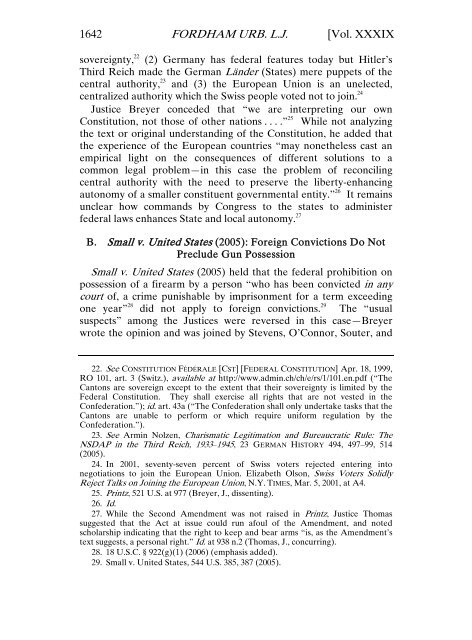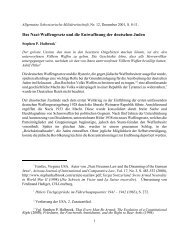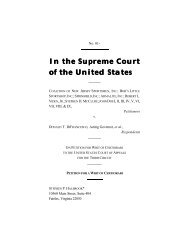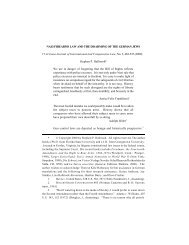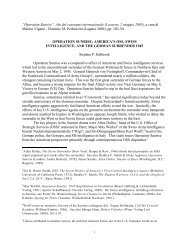France - Stephen P. Halbrook
France - Stephen P. Halbrook
France - Stephen P. Halbrook
Create successful ePaper yourself
Turn your PDF publications into a flip-book with our unique Google optimized e-Paper software.
1642 FORDHAM URB. L.J. [Vol. XXXIX<br />
sovereignty, 22<br />
(2) Germany has federal features today but Hitler’s<br />
Third Reich made the German Länder (States) mere puppets of the<br />
central authority, 23<br />
and (3) the European Union is an unelected,<br />
centralized authority which the Swiss people voted not to join. 24<br />
Justice Breyer conceded that “we are interpreting our own<br />
Constitution, not those of other nations . . . .” 25<br />
While not analyzing<br />
the text or original understanding of the Constitution, he added that<br />
the experience of the European countries “may nonetheless cast an<br />
empirical light on the consequences of different solutions to a<br />
common legal problem—in this case the problem of reconciling<br />
central authority with the need to preserve the liberty-enhancing<br />
autonomy of a smaller constituent governmental entity.” 26<br />
It remains<br />
unclear how commands by Congress to the states to administer<br />
federal laws enhances State and local autonomy. 27<br />
B. Small v. United States (2005): Foreign Convictions Do Not<br />
Preclude Gun Possession<br />
Small v. United States (2005) held that the federal prohibition on<br />
possession of a firearm by a person “who has been convicted in any<br />
court of, a crime punishable by imprisonment for a term exceeding<br />
one year” 28 did not apply to foreign convictions. 29 The “usual<br />
suspects” among the Justices were reversed in this case—Breyer<br />
wrote the opinion and was joined by Stevens, O’Connor, Souter, and<br />
22. See CONSTITUTION FÉDÉRALE [CST] [FEDERAL CONSTITUTION] Apr. 18, 1999,<br />
RO 101, art. 3 (Switz.), available at http://www.admin.ch/ch/e/rs/1/101.en.pdf (“The<br />
Cantons are sovereign except to the extent that their sovereignty is limited by the<br />
Federal Constitution. They shall exercise all rights that are not vested in the<br />
Confederation.”); id. art. 43a (“The Confederation shall only undertake tasks that the<br />
Cantons are unable to perform or which require uniform regulation by the<br />
Confederation.”).<br />
23. See Armin Nolzen, Charismatic Legitimation and Bureaucratic Rule: The<br />
NSDAP in the Third Reich, 1933–1945, 23 GERMAN HISTORY 494, 497–99, 514<br />
(2005).<br />
24. In 2001, seventy-seven percent of Swiss voters rejected entering into<br />
negotiations to join the European Union. Elizabeth Olson, Swiss Voters Solidly<br />
Reject Talks on Joining the European Union, N.Y. TIMES, Mar. 5, 2001, at A4.<br />
25. Printz, 521 U.S. at 977 (Breyer, J., dissenting).<br />
26. Id.<br />
27. While the Second Amendment was not raised in Printz, Justice Thomas<br />
suggested that the Act at issue could run afoul of the Amendment, and noted<br />
scholarship indicating that the right to keep and bear arms “is, as the Amendment’s<br />
text suggests, a personal right.” Id. at 938 n.2 (Thomas, J., concurring).<br />
28. 18 U.S.C. § 922(g)(1) (2006) (emphasis added).<br />
29. Small v. United States, 544 U.S. 385, 387 (2005).


